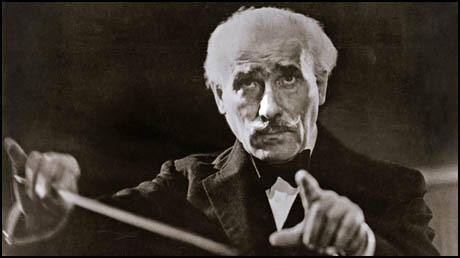Arturo Toscanini
Arturo Toscanini, the son of a tailor, was born in Parma, Italy, on 16th January, 1867. He studied at the conservatories of Parma and Milan before becoming a cellist.
Toscanini joined an Italian opera company and while performing Aida in Rio de Janeiro in 1886 the conductor was booed. Although only nineteen years of age, Toscanini took over the rostrum and had his first experience as conductor.
Toscanini continued to conduct and in 1891 he opened the season at the Carlo Felice and by 1898 was musical director of La Scala in Milan. He became the world's most famous conductor and was employed by the Metropolitan Opera House in New York (1908-1915) before returning to La Scala.
In Italy Toscanini was a leading critic of the fascist rule of Benito Mussolini. He refused to include the Fascist hymn, Giovinezza, in his concerts and while in Bologna in 1930 he was beaten up by a group of Mussolini's supporters. This failed to stop Toscanini expressing his views on politics and remained in Italy until it became clear that fascism was not going to be removed by logical debate.
In 1938 Toscanini went to live in the United States. Over the next twenty years he conducted the New York Philharmonic-Symphony Orchestra and created the National Broadcasting Orchestra of America. Arturo Toscanini died in New York on 16th January, 1957.


